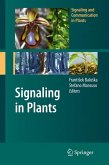Plants provide a source of survival for all life on this planet. They are able to capture solar energy and convert it into food, feed, wood and medicines. Though sessile in nature, over many millions of years, plants have diversified and evolved from lower to higher life forms, spreading from sea level to mountains, and adapting to different ecozones. They have learnt to cope with challenging environmental conditions and various abiotic and biotic factors.
Plants have also developed systems for monitoring the changing environment and efficiently utilizing resources for growth, flowering and reproduction, as well as mechanisms to counter the impact of pests and diseases and to communicate with other biological systems, like microbes and insects.
This book discusses the "awareness" of plants and their ability to gather information through the perception of environmental cues, such as light, gravity, water, nutrients, touch and sound, and stresses. It also exploresplants' biochemical and molecular "computing" of the information to adjust their physiology and development to the advantage of the species. Further, it examines how plants communicate between their different organs and with other organisms, as well as the concepts of plant cognition, experience and memory, from both scientific and philosophical perspectives. Lastly, it addresses the phenomenon of death in plants.
The epilogue presents an artist's view of the beauty of the natural world, especially plant "architecture".
The book provides historical perspectives, comparisons with animal systems where needed, and general biochemical and molecular concepts and themes. Each chapter is selfcontained, but also includes cross talk with other chapters to offer an integrated view of plant life and allow readers to appreciate and admire the functioning of plant life from within and without.
The book is a tribute by the Editor to his students, colleagues and co-workers and to thosein whose labs he has worked.
Plants have also developed systems for monitoring the changing environment and efficiently utilizing resources for growth, flowering and reproduction, as well as mechanisms to counter the impact of pests and diseases and to communicate with other biological systems, like microbes and insects.
This book discusses the "awareness" of plants and their ability to gather information through the perception of environmental cues, such as light, gravity, water, nutrients, touch and sound, and stresses. It also exploresplants' biochemical and molecular "computing" of the information to adjust their physiology and development to the advantage of the species. Further, it examines how plants communicate between their different organs and with other organisms, as well as the concepts of plant cognition, experience and memory, from both scientific and philosophical perspectives. Lastly, it addresses the phenomenon of death in plants.
The epilogue presents an artist's view of the beauty of the natural world, especially plant "architecture".
The book provides historical perspectives, comparisons with animal systems where needed, and general biochemical and molecular concepts and themes. Each chapter is selfcontained, but also includes cross talk with other chapters to offer an integrated view of plant life and allow readers to appreciate and admire the functioning of plant life from within and without.
The book is a tribute by the Editor to his students, colleagues and co-workers and to thosein whose labs he has worked.








